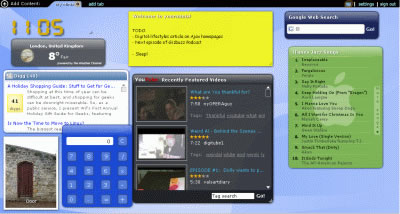 I’ve dabbled around with Linux in the past (including infamously self hosting GizBuzz on an old laptop, only to see it succumb to the Digg Effect when I wrote a post about how to set up your own web server). I am, however, a long way from being a Linux expert and have never considered installing and using it as a desktop operating system. Until now.
I’ve dabbled around with Linux in the past (including infamously self hosting GizBuzz on an old laptop, only to see it succumb to the Digg Effect when I wrote a post about how to set up your own web server). I am, however, a long way from being a Linux expert and have never considered installing and using it as a desktop operating system. Until now.
(more…)
Huw Leslie
Ubuntu: Linux Comes Of Age
Attention: A Cure For Information Overload?
 Information overload is a buzz phrase which has been getting a lot of use recently. It refers to the enormous amount of information which we now consume (largely because of the level of accessibility to content which the Internet gives us), and the challenges that that creates. Another important issue is the Long Tail, as recognised by Chris Anderson, and the way that relates to content. In other words, there is now far more information available which makes discoverability much harder.
Information overload is a buzz phrase which has been getting a lot of use recently. It refers to the enormous amount of information which we now consume (largely because of the level of accessibility to content which the Internet gives us), and the challenges that that creates. Another important issue is the Long Tail, as recognised by Chris Anderson, and the way that relates to content. In other words, there is now far more information available which makes discoverability much harder.Information Revolution Fails To Attract Popular Support
Readers in London may have noticed in the past couple of weeks, posters on the tube and elsewhere advocating an ‘Information Revolution’, in response to the fact that one company allegedly controls 80% of the information on the Web. No more information is given, but the ad suggests a visit to information-revolution.org to find out more.
 Sitting on the tube, opposite such an ad, I figured that there were only two possible companies which could be accused of controlling 80% of information on the Web; it could plausibly refer to either Internet Explorer’s market share (and would therefore be an advert for Firefox) or Google’s market share. Since I knew Mozilla wasn’t planning any advert like this, I assumed that it was a competitor to Google, and concluded it was probably Ask (since neither Yahoo or Microsoft would manage to think outside the box to such an extent). However, I dismissed that idea instantly as it seemed so unlikely that a well respected company would attempt such a pathetic campaign, and that therefore it must be some new search engine with far too much venture capital. By that point I had lost interest, and began examining the ventilation panel.
Sitting on the tube, opposite such an ad, I figured that there were only two possible companies which could be accused of controlling 80% of information on the Web; it could plausibly refer to either Internet Explorer’s market share (and would therefore be an advert for Firefox) or Google’s market share. Since I knew Mozilla wasn’t planning any advert like this, I assumed that it was a competitor to Google, and concluded it was probably Ask (since neither Yahoo or Microsoft would manage to think outside the box to such an extent). However, I dismissed that idea instantly as it seemed so unlikely that a well respected company would attempt such a pathetic campaign, and that therefore it must be some new search engine with far too much venture capital. By that point I had lost interest, and began examining the ventilation panel.I didn’t think any more about it until a storm erupted on the blogosphere a few days later. Ask guilty of astroturfing! screamed the headlines. The search engine had launched a deceptive marketing campaign (astroturfing because of the attempt to impersonate grass roots activity – get it) without disclosing that they were behind it. Finally getting round to looking at the campaign Website, I discovered a blog, including a post on why the ‘revolution’ had been forced to ‘go underground’:

The regime supporters are telling us to “advertise” the features we have, rather than wage an underground revolution. If only we had a choice! Everyone knows that: A) you have to try a feature to really understand it, and most people have been brainwashed that they don’t need to try another search engine’s features and B) advertising doesn’t work anymore!! That’s why we had to go underground.
Not to mention the factually inaccurate statement that the Internet is 15 years old – the world wide web is 15 years old. The Internet, as we all know, was born well before that. But we can’t blame them for the mistake, because, apparently ‘The Red Bull ran out at 1am on Saturday, so this post may not make much sense!’
My encounter with this revolution, which will inevitably result in a world changed forever in about a week’s time, was last Saturday evening, when a nice man from Ask offered me a free badge and a T-shirt in Covent Garden, from a peculiar-shaped trailer. I declined the gift, although I was very tempted to make my evening out more exciting by making use of their free Internet access inside the trailer. I was interested to see, however, that they had responded to the blogosphere by plastering an Ask logo on the trailer. Maybe the revolution felt that it was gaining enough momentum to come out into the open.
I didn’t tell the nice man from Ask this, but I have a suggestion to the revolution which I will tentatively put forward here (although those nasty spies from Google might also pick it up); build a better product. The route to market domination is not through silly campaigns where no-one can work out what is being advertised, but through making a product which is such an improvement over the existing market leader that people are prepared to switch. A departing thought; if Ask does manage to build a better product, and become the new monopoly, I wonder whether they will continue to advocate using search engines other than the most popular?
PS3 Home: The Virtual World Multiplies
 Sony is gearing up to launch a rival to popular online virtual world Second Life later this year. Playstation Home is a massively-multiplayer online game (MMO) in which a user adopts an avatar (a digital character which represents them) which they are then free to move around a virtual world, interacting with other avatars. In their Developer FAQs (PDF), Sony describes the project:
Sony is gearing up to launch a rival to popular online virtual world Second Life later this year. Playstation Home is a massively-multiplayer online game (MMO) in which a user adopts an avatar (a digital character which represents them) which they are then free to move around a virtual world, interacting with other avatars. In their Developer FAQs (PDF), Sony describes the project:Home™ is a real-time 3D, networked community that serves as a meeting place for PLAYSTATION3 (PS3) users from around the world, where they can interact, communicate, join online games, shop, share content and even build and show off their own personal spaces.
It looks like Home may well be going beyond Second Life in a few areas. Gaming is the most obvious, perhaps unsurprisingly given the link to the Playstation. Users will be able to play various different arcade games around the virtual world through their avatars. So I might decide to go for a virtual drink in a virtual pub with my virtual friends, and I would then be able to have a virtual game of pinball on a virtual pinball machine. You get the idea.

Probably more interesting is the ability to meetup with someone in Home, and then play a Playstation game with them over the Internet. Whilst the playing over the Internet idea is far from new, it is a unique way to approach it. It adds a social dimension to game play (along with the included voice chat) which could possibly make Internet gameplay far more addictive.
Sony are also taking user generated content seriously; as a user of Home I will be given, for free, an apartment, which I can then hang my own pictures up in and customise to my heart’s content, presumably buying various virtual items from Sony to add to my dream virtual home.
UGC is absolutely crucial for such games; it creates a feeling of ownership over the game for every individual user, making it far more sticky.

Commerce is not being overlooked. Sony state in their FAQs that:
Home prioritises community and entertainment over ecommerce. That said, we believe that there will be ample opportunities for businesses and individuals alike to generate significant revenues from the Home platform.
This is similar to the approach taken by Second Life and other MMO games, and it makes a lot of sense. Sony, and others who set up business in Home, will be able to make vast sums of money selling things which do not really exist and which cost little or no money to develop. In the modern world of games consoles being sold at a vast loss, manufacturers are looking at every possible avenue to create additional revenue streams.
Second Life has been hyped enormously, with pop concerts and press conferences from real bands and companies happening exclusively within Second Life. Despite this, I have always held Second Life in the greatest disdain; I spent about 15 minutes playing it some time ago and was struck by the pointlessness of it all. Whilst there are many, many people who are fans of such games, I have rightly or wrongly assumed that they are either people without a social life, who are fascinated in the technology or who are only able to create meaningful friendships through such a program.
I do not, however, treat Playstation Home with the same disdain. It seems that Home has a purpose, namely gaming, which should give the whole virtual world meaning. If I were able to afford a Playstation 3, I think I might well enjoy a quick stroll around Home to find someone to play against, and then actually playing the game with them. In Second Life all that is possible is the stroll, and I think that if virtual worlds are to live up to the hype, they have to offer more than a stroll.
[Engadget was a useful source]
Huw Leslie is editor of UK-based Web 2.0 and software blog Gizbuzz. He is the co-founder of the Oratos Media technology blog network, and his personal blog is For Crying Out Loud!
Wikipedia To Run Out Of Money?
Last week at the LIFT07 conference in Geneva, Florence Devouard, chairwoman of Wikimedia, the organisation behind the ubiquitous, editable-by-all online encyclopedia warned that Wikipedia was facing a serious financial crisis if it did not receive more funding soon.
 Whilst there have been sensationalist reports that Wikipedia would be forced to close in three to four months if the current financial situation continued, this has shown not to be the case by an interview of Devouard. She does stress, however, that Wikipedia cannot continue growing at the current pace if it does not find ways to raise money.
Whilst there have been sensationalist reports that Wikipedia would be forced to close in three to four months if the current financial situation continued, this has shown not to be the case by an interview of Devouard. She does stress, however, that Wikipedia cannot continue growing at the current pace if it does not find ways to raise money.Currently Wikimedia (which is a non-profit organisation) is funded almost entirely from donations, with the occasional content license deal. There can be little doubt that if Wikipedia were to run advertising, it could instantly become self sufficient, as Jason Calacanis, web media entrepreneur, has been advocating. They point to the success of the Mozilla Foundation (the makers of Firefox), another non-profit organisation, who are in a very good financial position thanks to an advertising deal with Google.
However, Wikimedia has not been keen to accept such advertising, in part due to the fear that it would taint the non-commercial nature of Wikipedia, and in part due to opposition from some users.
It would seem that Wikimedia has two options for the future of its funding; continue with the current approach of soliciting donations as the main source of income or accept advertising, with all the negative consequences that may follow.
There may, however, be a third way. I would like to see Wikipedia commercialised; there can be little doubt that it would be of enormous commercial value to a purchaser, and that its status as a revenue generating business would help to guarantee its future. Wikipedia’s objectivity as an organisation is sacrosanct, but so are Google’s search results. Google recognised when it was founded that it would cease to be of any value to its users the day that it accepted money for placement within its search results. The result is clearly labeled advertising which in no way detracts from a useful product, and an emphatically revenue positive company.
I see no reason why Wikipedia cannot experience the same kind of success that Google has enjoyed; a rich Wikipedia could afford to pay experts to review its articles, improving style and accuracy (and thereby removing a major concern which is a barrier to its mass adoption as a trusted source of information). A rich Wikipedia would ensure that this resource which has become crucial to our information age will remain for as long as it is needed.
Don’t forget that you can support Wikipedia by sending donations to support Wikipedia. (Thanks Mikker)
Huw Leslie is editor of UK-based Web 2.0 and software blog Gizbuzz, and the co-founder of technology blog network Oratos Media. His personal blog is For Crying Out Loud!Information Overload: How To Read The Web
It is often said that we live in the information era; the Internet is an enormous library of information (some high quality, some not so), with millions of new pieces being added every day. How to keep track of it all?
 The Answer
The Answer
RSS is a technology many (including me) are turning too. If you haven’t heard of it already, RSS stands for Really Simple Syndication and is essentially a way of describing, or ‘marking up’, content in a way which allows it to be displayed in many different ways and in places other than the site which created it. Digital-lifestyles publishes an RSS feed, as do most other news sites, and I am thus able to aggregate many different sources into one system to allow me to read my news more efficiently, visiting only one site rather than many.Unlike the process of checking websites you were interested in as and when you had time, RSS delivers the content as soon as it is published, whether you like it or not. Whilst you can still choose whether or not to read it within your reader, for many people seeing the notification ‘x new items’ is simply too tempting!
This problem of ‘information overload’ can be solved if there can be found some way of triaging the arriving information – in other words deciding what to read, and what to leave, and this is something that many different companies are working on, with two main schools of thought.
The Personalised Homepage
One option is a personalised homepage, with the more recent (and advanced efforts) coming from companies such as Google, Netvibes and YourMinis. I talked in more detail about these in December. Such a personalised homepage allows you to easily add content from RSS feeds (and other places) and drag them around your page into an arrangement which suits you. The page will typically show just the title of the item, sometimes with a short snippet, the theory being that this allows you to decide at a glance which posts you want to read, and thus click on to display the full item.The advantage of this approach is that it is a very efficient way to display a lot of information in a relatively small space. The disadvantage is that it is sometimes difficult to tell whether or not a post is interesting based purely on its headline and a short snippet – with a personalised homepage it is impossible to quickly scan the whole article.
 The Fully-Fledged Feed Reader
The Fully-Fledged Feed Reader
A second approach, which I have found myself favouring, is the use of a full-blown feed reader, such as Google Reader or Bloglines (both online applications) or Newsgator (offline application). Google Reader will allow me to see on a left hand panel which sources have new items, and click through to see them. Alternatively, I can use the ‘river of news’ function which will display all new items in a long list, with each post expanding when I click on it. I find that I am able to get through as many as 100 new items extremely quickly by scanning the post in perhaps two seconds, and then either reading it in detail or using a hotkey to move the reader to the next post. I am able to add a star to posts I am particularly interested in, but perhaps do not have time to read in detail immediately, and come back to them later. The advantage of a feed reader is that a well designed program allows fast scanning of posts in full, rather than just relying on the titles, but the disadvantage is that it is not possible to pick at a glance which posts to read, as they are not all displayed at the same time.Conclusions
In short, use of a personalised homepage will allow you to get through your news faster but you stand a greater chance of missing out on great content, whereas a feed reader may well take longer, but you are guaranteed to read everything of interest to you. I happen to prefer the feed reader.Information overload is a problem the Web has been working hard to solve. RSS, because of its efficiency, created new problems, but ultimately moved internet content consumption forward for the simple reason that it allows people to display content in many different ways, allowing people to innovate, and get closer to the ultimate aim of us each reading only the news that we are interested in, and being able to find that news easily.
Huw Leslie is editor of UK-based Web 2.0 and software blog Gizbuzz, and the co-founder of technology blog network Oratos Media. His personal blog is For Crying Out Loud!YourMinis Review:Ajax Homepages Explained
 What are Ajax homepages?
What are Ajax homepages?
Examples of some of the ideas behind the new spate of Internet applications, described by those in the know as Web 2.0, include Ajax, RSS, aggregation and user generated content. Most types of applications tend to choose just one or two characteristics of Web 2.0, but if there is one space which typifies the approach of the new Web, it is Ajax Homepages.The companies behind them, want you to set them as your browser homepage, and they each provide a multitude of ‘widgets’ for you to drag-and-drop onto your homepage, updating you on incoming email, latest items in RSS feeds you are watching. These widgets can also work as mini programs, providing functionality from calculators to free sending of text messages. The early releases came from Google (who decided to go out on a limb, naming theirs the Personalised Homepage), Netvibes and Pageflakes. In this article I want to give you a quick rundown on why I think Ajax homepages are becoming increasingly important and what challenges they face if they want to become successful.
YourminisThe best way to do this is probably through a case-study of my favourite Ajax homepage, yourminis. It’s actually inaccurate to call yourminis an Ajax homepage, since it is built with Flash, a different Web technology. That doesn’t matter, because what I’m really interested in here is what one might call the ‘ideology’ of these Web 2.0 homepages rather than the underlying technology.When you first visit yourminis, you are given a page with default ‘minis’ (their word for widgets). These include a Digg module and a YouTube module, amongst others. It is possible to add more minis from an impressive selection that includes a calendar, an email module, the iTunes chart and an MP3 player. Yourminis is aiming to become a place where you can pull in information from all round the Web from the sites that interest you, and be able to quickly see what is new since you last opened up your browser. If you’re into photo sharing site Flickr, you can see the latest photos from there. You can set it up so that the latest posts from Digital-lifestyles appear.
There are so many possibilities, and that’s the whole point. No-one uses the web in exactly the same way, and so what yourminis and the applications like them are trying to do is to allow you to create your own personal portal, far more flexible than the attempts of the last Web revolution, such as MyYahoo, which was hard to customise and offered far less content in the first place.

A feature that I particularly like about yourminis is the ability to publish pages that you have produced, so that your friends can see them. You could use it for research, or a more colourful example used by Goowy’s CEO, Alex Bard, is a page dedicated to a favourite band, with the latest news about them from various fan blogs combined with album art, all with their music playing in the background.
So, now you know why you should use a product like yourminis, but what does the future hold for them? A key challenge faced by providers of these Ajax homepages is monetisation; users would undoubtedly react badly to any attempt to plaster banner ads, or even contextual text links, onto their page that they have created. This was one of the questions I asked Goowy’s CEO when I interviewed him recently, and his approach to the monetisation of yourminis involves ‘value added revenue generation’. An example of this might be the affiliate revenue earned by yourminis when a user buys something from ebay using a mini on youminis. Around the biggest players (particularly Google), an ecosystem of third party developers producing widgets for the service is developing. As this happens, and the process of developing widgets becomes easier, the flexibility of the systems can only increase.
Huw Leslie is editor of UK-based Web 2.0 and software blog Gizbuzz, and the co-founder of technology blog network Oratos Media. His personal blog is For Crying Out Loud!
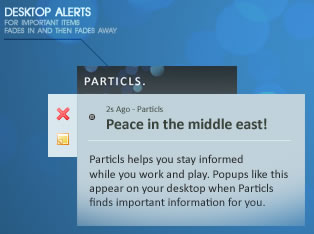 Information overload is a buzz phrase which has been getting a lot of use recently. It refers to the enormous amount of information which we now consume (largely because of the level of accessibility to content which the Internet gives us), and the challenges that that creates. Another important issue is the Long Tail, as recognised by Chris Anderson, and the way that relates to content. In other words, there is now far more information available which makes discoverability much harder.
Information overload is a buzz phrase which has been getting a lot of use recently. It refers to the enormous amount of information which we now consume (largely because of the level of accessibility to content which the Internet gives us), and the challenges that that creates. Another important issue is the Long Tail, as recognised by Chris Anderson, and the way that relates to content. In other words, there is now far more information available which makes discoverability much harder.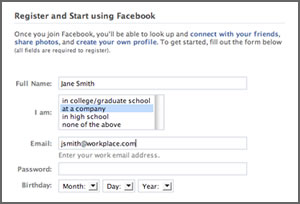 The Internet has undergone a revolution in the past few years, and one of the major trends we’ve seen is that of social networking. I suspect that a substantial proportion of those reading this are a member of one or more social networks, and those who are not are surely aware of the phenomenon which MySpace and others represent.
The Internet has undergone a revolution in the past few years, and one of the major trends we’ve seen is that of social networking. I suspect that a substantial proportion of those reading this are a member of one or more social networks, and those who are not are surely aware of the phenomenon which MySpace and others represent. Customisation
Customisation Sitting on the tube, opposite such an ad, I figured that there were only two possible companies which could be accused of controlling 80% of information on the Web; it could plausibly refer to either Internet Explorer’s market share (and would therefore be an advert for Firefox) or Google’s market share. Since I knew Mozilla wasn’t planning any advert like this, I assumed that it was a competitor to Google, and concluded it was probably Ask (since neither Yahoo or Microsoft would manage to think outside the box to such an extent). However, I dismissed that idea instantly as it seemed so unlikely that a well respected company would attempt such a pathetic campaign, and that therefore it must be some new search engine with far too much venture capital. By that point I had lost interest, and began examining the ventilation panel.
Sitting on the tube, opposite such an ad, I figured that there were only two possible companies which could be accused of controlling 80% of information on the Web; it could plausibly refer to either Internet Explorer’s market share (and would therefore be an advert for Firefox) or Google’s market share. Since I knew Mozilla wasn’t planning any advert like this, I assumed that it was a competitor to Google, and concluded it was probably Ask (since neither Yahoo or Microsoft would manage to think outside the box to such an extent). However, I dismissed that idea instantly as it seemed so unlikely that a well respected company would attempt such a pathetic campaign, and that therefore it must be some new search engine with far too much venture capital. By that point I had lost interest, and began examining the ventilation panel.
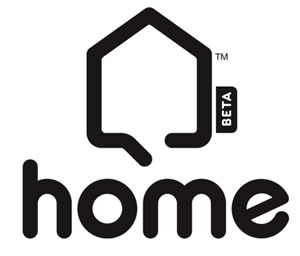 Sony is gearing up to launch a rival to popular online virtual world
Sony is gearing up to launch a rival to popular online virtual world 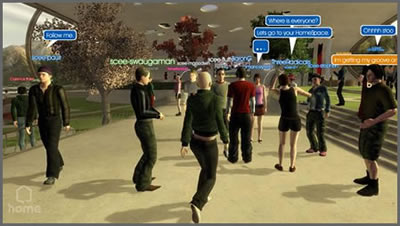

 In the wake of US newspaper
In the wake of US newspaper 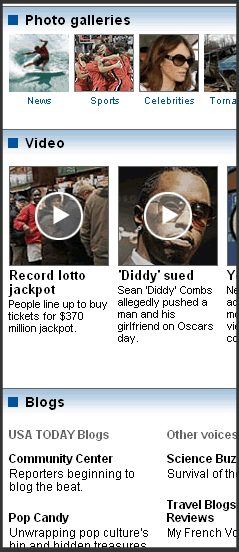 The recently relaunched
The recently relaunched 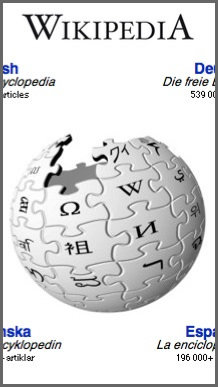 Whilst there have been sensationalist reports that Wikipedia would be forced to close in three to four months if the current financial situation continued, this has shown not to be the case by
Whilst there have been sensationalist reports that Wikipedia would be forced to close in three to four months if the current financial situation continued, this has shown not to be the case by  That’s the response that Yahoo! (the owners of popular Web 2.0 photo sharing site
That’s the response that Yahoo! (the owners of popular Web 2.0 photo sharing site 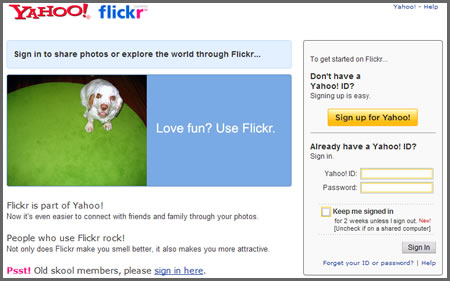
 The Answer
The Answer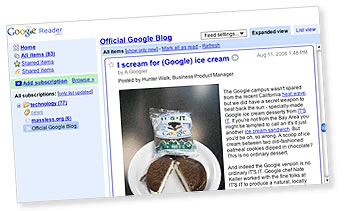 The Fully-Fledged Feed Reader
The Fully-Fledged Feed Reader What are Ajax homepages?
What are Ajax homepages?